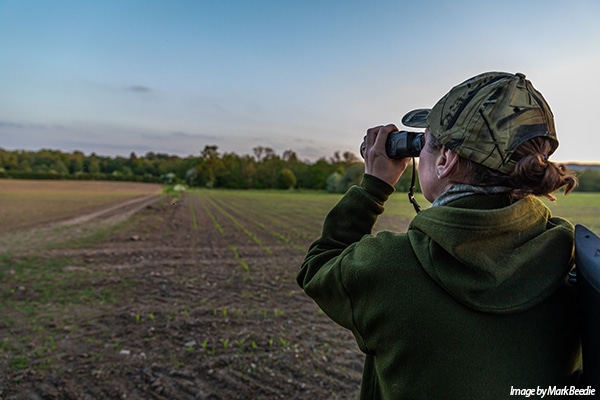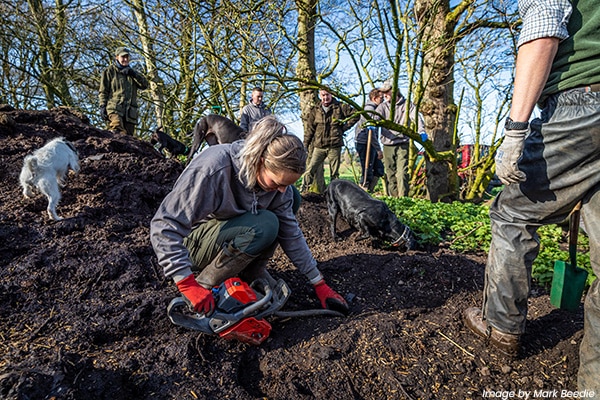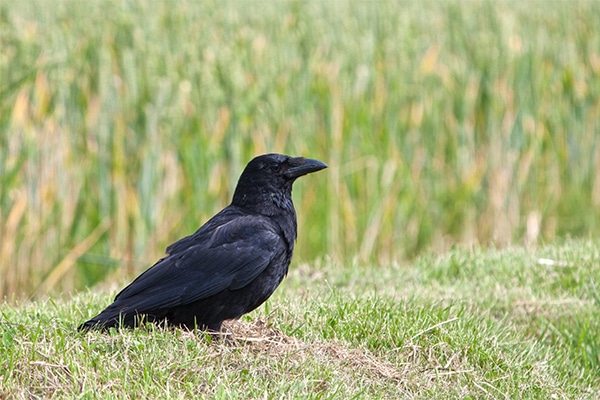
Where do I start?
The shooting of foxes, ground game, pest birds and rats is necessary to ensure that damage to game, wildlife, livestock, and growing crops is kept at sustainable levels.
Get information on the legal shooting season for mammals and birds in the UK.
Learn about our current conservation projects and how you can get involved.
Comprehensive information and advice from our specialist firearms team.
Everything you need to know about shotgun, rifle and airgun ammunition.
Find our up-to-date information, advice and links to government resources.
Everything you need to know on firearms law and licensing.
All the latest news and advice on general licences and how they affect you.

Pest and Predator Control Night shooting
The night shooting of foxes, ground game and rats is necessary to ensure that damage to game, wildlife, livestock and growing crops is kept at acceptable levels. It is a safe and effective method of control but it is the responsibility of all those involved in pest control to ensure that it is carried out properly.
High standards underpin public and political support for shooting, now and in the future.
The code provides advice at two levels:
The following golden rules apply:
Remember…
Remember…
It is essential when night shooting that the appropriate firearms and ammunition are used. Correct range judging is also essential to ensure the most effective shooting.
In most instances, the use of a centrefire rifle for fox control is preferred. However, over shorter distances and in certain circumstances, rimfire rifles may be appropriate.
Strong consideration should be given to the use of sound moderators for both rimfire and centrefire rifles, particularly in areas close to human habitation or livestock. Sound moderators bring significant additional benefits in terms of hearing protection.
Shotguns with large magazine capacities (more than two cartridges) offer the user a significant advantage when dealing with large numbers of pests. Relevant authorisation to hold such firearms will be required under firearms licensing laws.
For ranges up to 30 metres, a 12 bore shotgun with a load of not less than 36 grams of large shot such as no. 1 or no. 3 is recommended as an effective alternative to a centrefire rifle for fox control.
Air rifles can be an effective method for the night shooting of rats or rabbits at short ranges.
Under Section 19 of the Firearms Act 1968 and Article 61 (1) of the Firearms (Northern Ireland) Order 2004, a person commits an offence if, without lawful authority or reasonable excuse (the proof whereof lies with him), he has with him in a public place a loaded shotgun, an air weapon (whether loaded or not) or any other firearm (whether loaded or not) together with ammunition suitable for use in that firearm, or an imitation firearm.
‘Public place’ is defined as including any highway and any other premises or place to which at the time in question the public has access. It includes public rights of way.
Under Section 20 of the Firearms Act 1968 and Article 62 (2) of the Firearms (Northern Ireland) Order 2004, a person who enters or is on any land, or enters any building (or part thereof) as a trespasser while he has a firearm or imitation firearm with him, shall be guilty of an offence unless he shows that he had lawful authority or reasonable excuse for doing so. In the 1968 Act ‘land’ includes land covered with water.
The Highways Act 1980 Section 161 in England and Wales, makes it an offence to discharge, without lawful authority or excuse, any firearm within 50 feet of the centre of the highway (which consists of or comprises a carriageway) if in consequence of which a user of the highway is injured, interrupted or endangered. This does not apply to footpaths and bridleways.
In Scotland, the Highways Act does not apply but the offence of “reckless endangerment” exists under common law.
Article 61 (2) of the Firearms (Northern Ireland) Order 2004, states that a person who discharges any firearm on any public road, or within 18 metres of the centre of any public road, or in any church, churchyard or burial ground, shall be guilty of an offence unless he shows that he had lawful authority or reasonable excuse for doing so.
Complaints often arise from shooting taking place on the highway. To avoid liability, ensure that all shooting takes place from vehicles actually on adjacent land where you have permission to shoot.
Foxes
There are no specific legal restrictions on the night shooting of foxes. Authorised persons may legally carry out this form of fox control. Ensure that you comply with previous guidance in this code.
Restrictions on the taking and killing of rabbits and hares
The night shooting of rabbits and hares by tenants or occupiers of land, who are not the owners of the land, is subject to the following restrictions. These do not apply to landowners, but they should be aware of the legal restrictions on shooting hares at night:
The Wildlife and Countryside Act 1981 (Schedule 7) amended Section 6 of the Ground Game Act 1880 and Section 50 of the Agricultural (Scotland) Act 1948, to allow night shooting of ground game under certain conditions.
It is lawful for the occupier of any land himself, or one other person authorised by him, to use firearms for the purpose of killing ground game at night if the occupier has the written authority of a person entitled to kill or take the ground game on their land, e.g. the holder of shooting rights (except where the occupier has the exclusive rights). The following conditions apply:
1. No person should be authorised by the occupier to kill ground game except:
2. Every person so authorised by the occupier, on demand by any other person having a concurrent right or any person so authorised by him in writing, must produce their written authority. In default, a person would not be deemed to be an ‘authorised person’.
There is no close season for rabbits or prohibited time of taking, with the exception of the provisions of the Ground Game Acts 1880 and 1906, relating to the taking of rabbits on moorland and on unenclosed land.
There is no close season for hares in England and Wales, except for the provisions of the Ground Game Act 1880 and 1906 relating to the taking of hares on moorland or unenclosed land. Hares are included in the definition of ‘game’ in the Game Act 1831 and are therefore protected on Sundays and Christmas Day.
In Scotland, under the Wildlife and Countryside Act 1981, as amended by the Wildlife and Natural Environment (Scotland) Act 2011, there is a close season for brown hare from 1 February to 30 September.
In England and Wales, the Hares Preservation Act 1892 makes it an offence to sell or expose for sale any hare or leveret between 1 March and 31 July inclusive. This does not apply to imported foreign hares. In Scotland, there is no close season for the sale of hares, however, under the Wildlife and Countryside Act 1981 as amended by the Wildlife and Natural Environment (Scotland) Act 2011, it is an offence to have in your possession, sell or offer to sell any hare which has been illegally taken.
England and Wales: Under the Conservation of Habitats and Species Regulations, it is an offence to shoot mountain hares (Lepus timidus) at night with the aid of a lamp or image intensifier, or at any time using any semi-automatic weapon with a magazine capable of holding more than two rounds of ammunition. However, licences can be granted to allow night shooting under certain circumstances.
Scotland: Under the Animals and Wildlife (Scotland) Act 2020, it is illegal to intentionally kill, injure or take mountain hares at any time unless a licence is obtained.
Moorland and unenclosed land does not include arable land or detached portions of land less than 25 acres which adjoins arable land.
In England and Wales, under the Ground Game Act 1880, as amended by the Ground Game (Amendment) Act 1906, occupiers or authorised persons may only take and kill ground game on moorland or unenclosed land between 1 September and 31 March inclusive; however, firearms may only be used for such purposes between 11 December and 31 March.
In Scotland, the Ground Game Act 1880 has been amended as follows by the Agriculture Act (Scotland) 1948 and the Wildlife and Natural Environment (Scotland) Act 2011: The occupier of the land or persons authorised by him may take rabbits, throughout the year, on moorlands and unenclosed lands (not being arable) by all legal means other than by shooting, and by means of firearms over the period from 1 July to 31 March inclusive.
BASC runs the following courses: Sporting Rifle Course – Small Game & Lamping; Advanced Airgun Hunter; Firearms Awareness Training; and Shotgun Safe Shot. Contact the BASC training and education department on 01244 573 018 for further details.
It is advisable to have adequate legal liability (third-party) insurance when shooting. Membership of BASC includes insurance for recreational sporting activities.
All those who shoot in Britain should conduct themselves according to the law and to the highest standards of safety, sportsmanship and courtesy, with full respect for their quarry and a practical interest in wildlife conservation and the countryside. If in doubt, contact BASC.

The shooting of foxes, ground game, pest birds and rats is necessary to ensure that damage to game, wildlife, livestock, and growing crops is kept at sustainable levels.

We run a wide range of courses, covering all areas of shooting, including an introduction to woodpigeon shooting.

Pest and predator control is an integral part of conservation and wildlife management and it is necessary to reduce predation and damage to acceptable levels.
Sign up to our weekly newsletter and get all the latest updates straight to your inbox.
© 2023 British Association for Shooting and Conservation. Registered Office: Marford Mill, Rossett, Wrexham, LL12 0HL – Registered Society No: 28488R. BASC is a trading name of the British Association for Shooting and Conservation Limited which is authorised and regulated by the Financial Conduct Authority (FCA) under firm reference number 311937.
If you have any questions or complaints about your BASC membership insurance cover, please email us. More information about resolving complaints can be found on the FCA website or on the EU ODR platform.
This website uses cookies so that we can provide you with the best user experience possible. Cookie information is stored in your browser and performs functions such as recognising you when you return to our website and helping our team to understand which sections of the website you find most interesting and useful.
Strictly Necessary Cookie should be enabled at all times so that we can save your preferences for cookie settings.
If you disable this cookie, we will not be able to save your preferences. This means that every time you visit this website you will need to enable or disable cookies again.
This website uses Google Analytics to collect anonymous information such as the number of visitors to the site, and the most popular pages.
Keeping this cookie enabled helps us to improve our website.
Please enable Strictly Necessary Cookies first so that we can save your preferences!
More information about our Cookie Policy